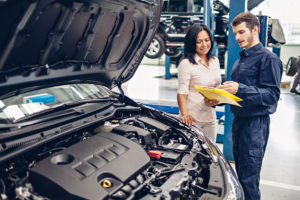
Sure thing: Are new car warranties a safe bet?
Last updated on July 1st, 2022
For many of us, cars are our second most expensive investment after our home. So it's only right to want some peace of mind when it comes to buying one.
Enter: the car warranty. In Australia, most new cars come with a manufacturer's warranty. That warranty covers you for a set period of time, usually three years. But in recent times, we've seen an increase in the number of brands offering longer warranties. Up to 10 years in some cases. It's a persuasive marketing tool.
But in December 2021, the Australian Competition and Consumer Commission (ACCC) issued a warning against the automotive sector. It says "there is still more work to do regarding misleading information and denied warranty claims”.
The ACCC says the issues have been going on since 2015 and the industries involved have been penalised a total of more than $135 million.
So what's the story? Are longer car warranties a safe bet or just a cynical ploy to get your business?
What is a new car warranty?
A new car warranty is a type of car insurance policy that covers repairs and maintenance for a certain period of time. This coverage is typically provided by the manufacturer. It can range from three to seven years. One company has even made it 10 years.

Most new car warranties will cover the cost of parts and labour for repairs related to faults in materials or workmanship. This means that if something goes wrong with your car due to a manufacturing error, you shouldn't have to pay a cent. In some cases, the warranty may also cover things such as roadside assistance and rental car reimbursement, if you are without your car for some time.
It's important to note that warranties may not cover regular maintenance. This refers to oil changes, normal wear and tear items, such as brake pads and tyres - although tyre manufacturers have a separate warranty. It also doesn't cover damage as a result of an accident, misuse of the car and any modifications.
What is the history of new car warranties?
New car warranties have been around for quite some time, but they used to be much less comprehensive.
It all started in the 1920s when Henry Ford offered “90 days on material; 30 days on labour. No guarantee whatsoever on fan belts, glass, bulbs, wiring, transmission bands, hose connections, commutator shells, rollers, spark plugs or gaskets".
This became the industry standard until the 1950s. By 1960, warranties had started to resemble what we know today.
In the past, most car warranties only covered three years or 60,000 km, whichever came first. Nowadays, it's not uncommon to see warranties offered for seven years or 160,000 km.
The longer warranties are partly because cars have become much more reliable. Advances in technology and manufacturing have lead to a decrease in the number of warranty claims.
Secondly, longer warranties are attractive to buyers seeking peace of mind and help to differentiate one brand from another. And, of course, they're simply a good marketing strategy to attract buyers.
Some experts believe that longer car warranties have a positive impact on our appetite to buy a car. This is because they make us feel more confident in our purchase.
Others argue that most car buyers don't actually use them. And that the companies who offer them are simply taking advantage of our fear of repairs.
Which brands in Australia offer the longest warranty?
In their competition for your vehicular dollars, many manufacturers have long since replaced the standard three-year warranty with five years or more. But there are others who have gone the extra mile:
Ten years
Mitsubishi
The default warranty is the standard five-year/100,000 km guarantee. If you only get your car serviced at a Mitsubishi service centre or authorised Mitsubishi Motors Dealer Network during this period, however, you can extend the coverage to 10 years or 200,000 km at no extra cost.Eight years
Hyundai
All Hyundai vehicles are backed by its standard five-year unlimited-kilometre warranty. For Hyundai electric and hybrid vehicles, the battery is covered by an eight-year replacement warranty or 160,000 km, whichever comes first.Seven years
GWM/Haval
GWM's 7-year/unlimited-kilometre vehicle warranty applies to all new GWM and HAVAL vehicles sold and delivered after 1 October 2018. Cars sold and delivered prior to this time are backed by a five-year or 100,000 km warranty. All Great Wall Steed models sold after 1 April 2019 have a five-year or 150,000 km warranty.KIA
Selected KIA cars sold from 1 October 2014 are backed by the seven-year, unlimited-kilometre warranty. Except where items are expressly excluded or for which a separate warranty applies. For High Voltage Electrical Vehicle Systems Components - such as on-board charger, traction motor, electric power control unit (EPCU & HPCU), high voltage (HV) battery system - a limit of 150,000 km applies.MG
The warranty applies to all vehicles (traditional, EV or hybrid) for private use. It begins on the day the vehicle is first registered or the date of sale to its first owner, whichever is the sooner. The car’s battery and decals, however, only have a two-year warranty.SsangYong
All vehicles sold from 1 September 2018 are backed by the seven-year, unlimited kilometre warranty. However, some parts are covered for less time. Accessory drive belts, for example, are only covered for two years or 40,000 km, whichever comes first.Six years
Isuzu UTE
All Isuzu UTE Vehicles (D-Max and MU-X) with a warranty start date on or after 1 January 2019 are backed by the six-year or 150,000 km warranty, whichever comes first. It excludes trays and accessories.What extras are available for car warranties?
Some manufacturers also offer extended warranties in addition to the standard warranty coverage. These are typically available for an additional cost. These can extend the coverage period for repairs and maintenance by two to three years.
In some cases, the extended warranty may also cover things such as roadside assistance or breakdown cover.

Breakdown cover is a free or paid service – depending on the car manufacturer – that assists if your car breaks down. It may cost a little below $100 or more than $300. Usually, the basic offer includes a call centre, which will try to diagnose your problem and guide you to fix it on your own. It may also include an on-call technician if the first option doesn't work.
Extra services can include things such as towing, jump-starting, and flat tyre changes — all depending on how much you pay. It's not uncommon for towing to be part of your car manufacturer's warranty, so always check this with them.
Car manufacturers typically offers a breakdown cover. It is an add-on to an extended warranty by car insurance companies and state-based motoring clubs. It applies to both the city and country areas but the cost can be higher for the latter. Be sure to check with the assistance provider to see if your area is covered, especially if you live in a remote area.
Is it worth paying for an extended car warranty?
Ultimately, the decision comes down to personal preference and your own risk tolerance.
But note that these policies may restrict your choice of mechanic and parts used. It may also bind you to a service schedule with a specific dealer or group of dealerships. This could prove more costly than having it serviced by a mechanic you know and trust.
However, taking your car to a mechanic not affiliated with the dealer or manufacturer does not void your warranty. Any qualified mechanic can service your car. Provided they have filled out the log book appropriately and using quality parts. Don’t let the dealer tell you otherwise. The ACCC is clear about this and you will be protected under Australian Consumer Law.
Do your research and read the fine print no matter which way you’re leaning. Also, make sure the extended warranty offers protection beyond the consumer guarantees on cars offer by the law. Extended car warranties are not a one-size-fits-all solution. So choose one that's right for you and your circumstances.
How to cash in on your warranty
If you do find yourself in need of a repair, the process is usually pretty simple. The first step is to take your car to an authorised repairer. They'll assess the problem first. Then they'll fix it as soon as possible if they find that it's covered by your warranty. If not, they'll give you a quote for the repairs. Then you can take this quote to your warranty or insurance provider.
Once you've submitted a claim, the team at your warranty provider will assess it. Then they'll decide whether or not to approve it. If they do, they'll pay the repairer directly and you won't have to pay a cent. If not, you'll be stuck with the bill. But you can file an appeal with relevant agencies if you disagree with the provider’s decision.
Repair, replace or refund
What if the repair will leave you carless for days, weeks or even months? Or the car has multiple failures? Luckily, the law has our back.
If you're certain the car breakdown is a manufacturer's fault, you can get either a repair, replacement car or refund at no cost. This depends on what is wrong with the car. According to the ACCC, a major failure happens when:
-
- Your car cannot be fixed or it is too difficult to fix your car within a reasonable time. (e.g. your car develops excessive jerking due to a manufacturing defect that cannot be repaired. Or the defect is too difficult to repair within a reasonable time.)
- If, as a reasonable consumer who was fully aware of the nature and extent of the failure, you would not have bought the car. (e.g. your car suddenly and unexpectedly loses power due to a manufacturing defect.)
- The failure prevents you from using your car and it cannot be fixed in a reasonable time. (e.g. your car is not drivable due to a manufacturing defect and is incapable of being repaired in a reasonable time.)
- The failure creates an unsafe situation. (e.g. your car has a fault that affects your ability to brake or steer the car easily.)
A minor failure is when "your new car can be fixed, or the problem can be resolved, within a reasonable time. (e.g. your car’s engine develops a slight rattling noise that doesn’t interfere with its ordinary operation, and can be successfully repaired within a reasonable time.)"
Note that two or more minor failures, according to Choice, also constitute a major failure.
When to repair
Repairs should be done first by the manufacturer's service centres within a reasonable time. If they are unable to do this, you can take it to any repair centre of your choice at no cost. For one minor failure, you should give the manufacturer a chance to repair your car. Beyond that, opt for a replacement or a refund.
When to get a replacement
A like-for-like replacement car is another option if repairs cannot be carried out. Companies such as I'm In The Right and Unlucky offer this service. Note that this only applies to major car failures. But this can also apply when the service centre cannot provide a remedy within a reasonable time.
When to get a refund
You can also opt for a refund if a replacement car is not available or the repairs cannot be carried out in a reasonable time. This applies to major failures only and will be based on the car's purchase price. You should also get any unused registration and transfer fees back. As well as other incidental costs such as towing charges if your car broke down away from home.
What are the common complaints with new car warranties?
The most common complaint with new car warranties is that they don't cover everything. And while this is true to some extent, it's important to remember that no warranty is going to cover every single problem you might have. A warranty is not insurance. That's why it's so important to determine exactly what's included before you buy.
Another common complaint is that warranty providers are difficult to deal with. Here are some companies investigated by the ACCC for how they handled customer complaints regarding their car problems:
Chrysler
Chrysler customers around the country were dissatisfied with their interactions with the firm. This was highlighted by a slew of customer-related issues, including delays in getting spare parts and failing to properly answer customer complaints.Ford
Ford was penalised $10 million in 2018. "Despite knowing that shuddering was a symptom of the quality issues with the vehicles, Ford frequently told customers that shuddering was the result of the customer’s driving style," according to the ACCC report.Holden
Holden acknowledged that it misled some consumers into believing that it had discretion to choose whether or not a vehicle owner would receive a refund, repair, or replacement for a car with a manufacturing defect. Also, some customers were incorrectly denied a repair because the vehicle was either serviced by another non-Holden approved service centre or it wasn't serviced regularly.
Hyundai
Hyundai had issues with its compliance with consumer guarantee obligations under the Australian Consumer Law. The company gave an undertaking to fix this, including providing “consumers with the ability to obtain information online about any technical and/or safety issues with their vehicle and any available remedies”.Mazda
Mazda was taken to court after allegedly "repeatedly (refusing) to provide a refund or a replacement at no cost to the consumers and pressured them to accept lesser offers”.Mercedes-Benz
Mercedes-Benz was accused of minimising the risk of serious injury or death from faulty Takata airbags when speaking with vehicle owners who contacted its customer service centre. It also allegedly failed "to comply with their obligations under a compulsory recall of defective, and potentially deadly, Takata airbags”.Toyota
Toyota customers had repeated issues with the Diesel Particulate Filter (DPF). Instead of offering refund and replacement, as stated in the consumer guarantee, customers were offered repairs "on multiple occasions without remedying the DPF issues”.Volkswagen
Volkswagen was penalised more than once. First for failing to remedy cars covered by the consumer guarantee. And second, for making false representations about compliance with Australia’s diesel emissions standards.Finally, if you’re not too careful, car manufacturers and dealers can hoodwink you with their shiny new car warranties. In 2021, for example, the ACCC put car dealers and manufacturers on notice (again) for allegedly “not doing enough to meet their obligations under Australian Consumer Law – which supersedes a manufacturer’s warranty, despite assurances from car dealers”.
The Western Australian Government also issued a warning against retailers that misled buyers about warranty rights when buying a demo car. Demo car buyers are duped into thinking that they are not entitled to the “full term of the manufacturer’s warranty in terms of time”.
Know your warranty
A new-car deal that offers a seven-year warranty and/or high kilometres is very tempting. But it doesn’t always mean you’re getting the best bang for your buck.
What you think might be automatically covered is not necessarily part of the warranty’s scope. Make sure you understand what's included in the offer. Don't easily fall for the lure of a longer warranty, or add an extended one to your purchase.
Shop around for the best deal and, as always, reach out to Handle My Complaint if your car warranty is not living up to expectations.






